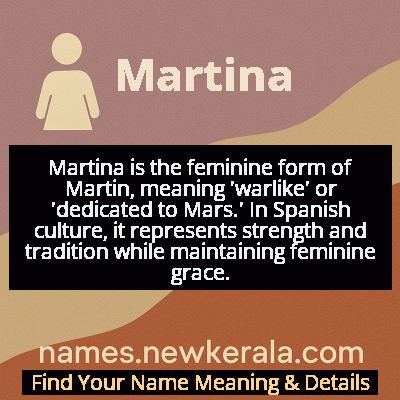Martina Name Meaning & Details
Origin, Popularity, Numerology Analysis & Name Meaning of Martina
Discover the origin, meaning, and cultural significance of the name MARTINA. Delve into its historical roots and explore the lasting impact it has had on communities and traditions.
Name
Martina
Gender
Female
Origin
Spanish
Lucky Number
4
Meaning of the Name - Martina
Martina is the feminine form of Martin, meaning 'warlike' or 'dedicated to Mars.' In Spanish culture, it represents strength and tradition while maintaining feminine grace.
Martina - Complete Numerology Analysis
Your Numerology Number
Based on Pythagorean Numerology System
Ruling Planet
Uranus (Rahu)
Positive Nature
Strong sense of order, loyal, practical, and disciplined.
Negative Traits
Stubborn, overly serious, rigid, and prone to feeling restricted.
Lucky Colours
Blue, gray.
Lucky Days
Saturday.
Lucky Stones
Blue sapphire.
Harmony Numbers
1, 7, 8.
Best Suited Professions
Managers, engineers, accountants, organizers.
What People Like About You
Dependability, discipline, practicality.
Famous People Named Martina
Martina Navratilova
Tennis Player
Won 18 Grand Slam singles titles and 31 major women's doubles titles
Martina McBride
Country Music Singer
Multiple Grammy nominations and CMA Awards with powerful vocal performances
Martina Hingis
Tennis Player
Youngest ever Wimbledon champion and 5-time Grand Slam singles winner
Saint Martina of Rome
Christian Martyr
Venerated saint known for steadfast faith during Roman persecution
Name Variations & International Equivalents
Click on blue names to explore their detailed meanings. Gray names with will be available soon.
Cultural & Historical Significance
The name's evolution reflects changing attitudes toward feminine strength. Originally tied to martial qualities through its connection to Mars, Martina has transformed to represent modern feminine power—combining traditional resilience with contemporary achievement. In Hispanic cultures, it maintains its religious significance while adapting to modern contexts, making it a popular choice for parents who value both heritage and progressive values. The name's international recognition through sports and entertainment has further enriched its cultural significance, creating a multifaceted identity that spans religious devotion, athletic excellence, and artistic expression.
Extended Personality Analysis
Women named Martina are often perceived as strong-willed, determined individuals with natural leadership qualities. They tend to be competitive and driven, approaching challenges with strategic thinking and resilience. This aligns with the name's 'warlike' origins, though in modern contexts it manifests as ambition and perseverance rather than aggression. Martinas are typically confident and self-assured, capable of making difficult decisions and standing by their convictions. They often possess a protective nature toward loved ones and will fiercely defend their principles and those they care about.
Beyond their evident strength, Martinas frequently demonstrate remarkable emotional intelligence and loyalty. They balance their assertive nature with deep compassion, creating relationships built on mutual respect and trust. Their combination of practical problem-solving skills and emotional awareness makes them excellent in leadership roles where both strategic thinking and people management are required. Many Martinas exhibit a creative side that complements their analytical abilities, allowing them to approach challenges from multiple perspectives. While they can be formidable when challenged, they typically prefer diplomacy and collaboration over confrontation, using their strength to build rather than destroy. This complex blend of traits makes Martinas adaptable individuals who can thrive in diverse environments and situations.
Modern Usage & Popularity
Martina maintains steady popularity in Spanish-speaking countries and has experienced periodic resurgences in English-speaking nations, often influenced by famous athletes and entertainers. In Spain and Latin America, it remains a classic choice that bridges traditional and contemporary naming trends. The name saw significant popularity spikes following Martina Navratilova's tennis dominance in the 1980s and Martina McBride's music career in the 1990s. Currently, it enjoys moderate but consistent usage, appealing to parents seeking a name that is both feminine and strong. In the United States, it ranks outside the top 200 names but maintains a presence, while in countries like Italy, Spain, and Germany, it remains more commonly used. The name's international appeal and easy pronunciation across multiple languages contribute to its enduring modern relevance, making it a sophisticated choice for parents valuing both cultural heritage and global connectivity.
Symbolic & Spiritual Meanings
Symbolically, Martina represents strength, protection, and martial energy channeled into positive pursuits. The connection to Mars, the Roman god of war, translates metaphorically to courage in facing life's battles and the determination to overcome obstacles. The name embodies the concept of 'warrior spirit' applied to modern contexts—fighting for one's beliefs, protecting loved ones, and pursuing goals with relentless energy. It also carries connotations of fertility and agricultural abundance through Mars' secondary role as a guardian of farmland, symbolizing growth and nurturing alongside strength. The name suggests a balance between assertive action and protective care, making it symbolic of maternal strength and feminine power. In psychological terms, Martina represents the integration of traditionally masculine qualities like assertiveness with feminine strengths like intuition and emotional intelligence, creating a holistic symbol of empowered femininity.

